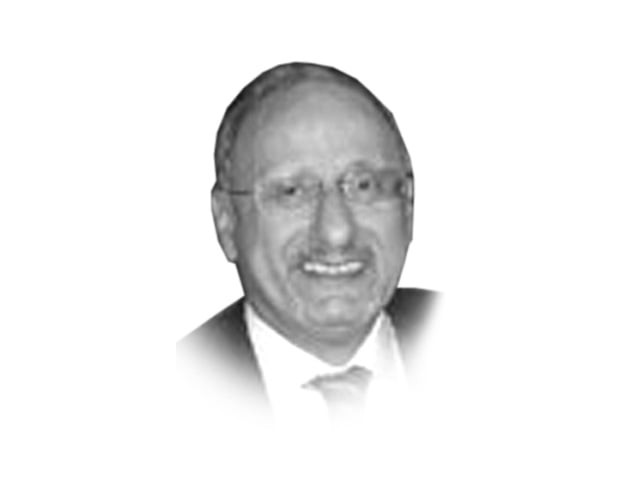We have no money — but all is well
Economics has taken a back seat to politics, perhaps, because our leaders do not find the subject sufficiently ‘sexy’.

We have no money — but all is well
Even though Pakistan is virtually bankrupt there’s no sense of crisis or of desperation among our leaders. They seem oblivious to the social and political instability that threatens us. They are unwilling or unable, for example, to agree on measures that they should have taken long ago; and not merely to obtain the next tranche of IMF emergency assistance. It’s extraordinary, but they do not seem to care. To them a budget is merely a method of worrying before you spend instead of afterwards. And if you remind them that the domestic debt now stands at Rs5 trillion, they answer: “So what if you owe yourself some money”.
And all the time raucous debate on political issues continues unabated. Deadly political games, without giving thought to the terrible consequences of our political addictions and disastrous ambitions, are being played out. TV anchors, whose stupidity ranks with those of molluscs, take advantage of differences to boost their ratings, often acting as sparring partners prior to a championship fight rather than as hosts.
Our leaders have never let an economist get within hailing distance of their gaddi, let alone sit on one next to them. Chaudhry Mohammed Ali, Syed Amjad Ali, Ghulam Mohammed, Mohammed Shoaib, et al, were either civil servants or politicians. And, lest some claim that Shaukat Aziz was an economist, he was decidedly not. He was an ingratiating private banker/public relations man at best. As for Mohammedmian Soomro, another banker, during his (mercifully) brief three-month tenure as caretaker prime minister he gave away more per day in subsidies/charity than any other prime minister. Besides, when it came to understanding economics, Aziz and Soomro acted as if they belonged to the economics nursery, like the present incumbent, who acts as their replica.
The politician’s obsession with politics and the polemics that it has unleashed, has locked us into inexorable decline and blinkered our sense of nationhood. Playing politics with the economy, trying to create jobs out of thin air and printing money artificially to create a few jobs, is landing us in deeper debt and higher inflation. It has skewed policies, skewed priorities and skewered the nation. It may be a part of our political inheritance but it is time that we address it. Henceforth, it must be economics first and politics second.
There was a brief period in our very chequered past when economics was our priority and that was during the Ayub era, when the South Koreans and others were impressed by our model of development. But that got derailed by politics, that went out of control because of the infantile populism of the Bhutto era. Hence, while the South Koreans made huge headway, we went astray.
The great Zulfikar Ali Bhutto (ZAB) for all his many virtues and who, to the everlasting gratitude of the people gave them a voice, alas, gave them nothing else. His nationalisation not only destroyed the industrial and entrepreneurial base but also opened up the nationalised banks to squandering by politicians and generals on a mind-boggling scale in the 80s and 90s. It opened the floodgates to high-level corruption and, since then, our politicians and their business allies have never looked back.
The big foundries and complexes that ZAB set up eventually turned out to be white elephants. The expenditure incurred in keeping the Steel Mills afloat, for example, would have purchased several times the amount of steel that it ever produced and, probably, of a better quality. Another example of our abysmal decline is the mess that goes by the name of PIA, once a top international airline.
In theory, only an economic vision that holds forth a real promise of significant change in the people’s lives can reverse the prevailing stagnation and make a big difference. What could be that vision?
First we must forego short-term political objectives often tied to the person in power — this has not allowed long-term planning and strategic thinking. As a consequence, public education on economic issues has been woefully poor, consisting mainly of populist slogans, promises, distortions about what happened in the past and scathing rhetoric directed at opponents. We have to find ways of unlocking the huge domestic capital in which we should include the estimated $180 billion held abroad by Pakistanis who have shied away from productive investment in our tricky political environment.
Second, we need to take advantage of our geopolitical location to invite large investments from China and eventually India and other countries as part of a regional framework for economic development encompassing South, Southwest and Central Asia. We are fortunate that China, the emerging economic superpower, neighbours us and seeks an outlet to the sea for its burgeoning trade and commerce. China’s close engagement alone will take us far.
But none of this will happen on a large scale or on a sustained basis unless we realise that, as a nation, we have to make ourselves attractive to long-term investors and entrepreneurs. And we cannot make ourselves attractive to them unless we are able to galvanise as a nation to stem anarchy and extremism. Finally, we need political stability in order to rebound economically.
In other words, we have to gravitate around this vision as a nation before the miracle of an economic upswing can happen. Focusing on finding a way out of our economic mess will help us restore some mental discipline in our reckless political thinking. Instead, like Sheikh Chilli, we appear to be merrily chopping the very branch on which we are sitting.
Published in The Express Tribune, February 7th, 2011.















COMMENTS
Comments are moderated and generally will be posted if they are on-topic and not abusive.
For more information, please see our Comments FAQ